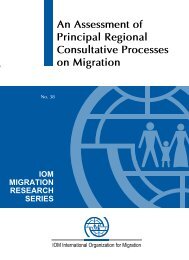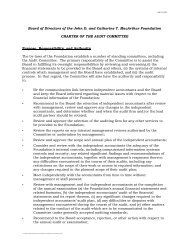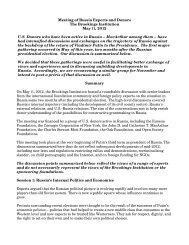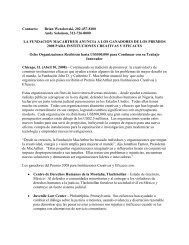A Global Compact on Learning - Brookings Institution
A Global Compact on Learning - Brookings Institution
A Global Compact on Learning - Brookings Institution
You also want an ePaper? Increase the reach of your titles
YUMPU automatically turns print PDFs into web optimized ePapers that Google loves.
New financing windows. In additi<strong>on</strong> to the<br />
FTI’s existing EFA fund, it will need to develop<br />
new mechanisms by January 2012<br />
to facilitate private sector investment in<br />
educati<strong>on</strong>, such as large-scale innovative<br />
financing initiatives, particularly to improve<br />
learning for the most marginalized<br />
children. Direct and daily management<br />
of these mechanisms will need to sit<br />
outside the World Bank and the existing<br />
FTI board to ensure the necessary level<br />
of flexibility and efficiency to effectively<br />
engage with private sector actors. This<br />
will serve to increase private sector resources<br />
for educati<strong>on</strong>, better align them<br />
with developing countries’ plans, and ensure<br />
complementarities with initiatives<br />
undertaken by other actors.<br />
An empowered secretariat. To accomplish<br />
these steps, the FTI secretariat leadership<br />
must be empowered to engage at<br />
a senior internati<strong>on</strong>al level. Additi<strong>on</strong>al<br />
staff with diverse skill sets, including in<br />
all three core priorities for improving<br />
learning, must be engaged to support<br />
FTI’s expanded role.<br />
Acti<strong>on</strong>s for Developed Country<br />
Governments and the G-20<br />
High-level political leadership within developed<br />
countries is needed to ensure that learning for all<br />
becomes a reality. Bilateral d<strong>on</strong>ors play a crucial role<br />
in incentivizing educati<strong>on</strong> reforms, both within the<br />
multilateral aid system and with developing country<br />
governments. Str<strong>on</strong>g statements backed by acti<strong>on</strong>,<br />
particularly from the G-8 and G-20 countries, <strong>on</strong><br />
the importance of learning, especially for the most<br />
marginalized children, will be needed to ensure that<br />
sufficient attenti<strong>on</strong> is given to the issue. Aid d<strong>on</strong>ors<br />
must also prioritize learning for all within their own<br />
educati<strong>on</strong> assistance strategies, including focusing<br />
<strong>on</strong> the three priorities articulated in this <str<strong>on</strong>g>Global</str<strong>on</strong>g><br />
<str<strong>on</strong>g>Compact</str<strong>on</strong>g> for <strong>Learning</strong> and their respective strategies.<br />
Specific acti<strong>on</strong>s include:<br />
• G-8 and G-20. Prioritize educati<strong>on</strong>, specifically<br />
improved learning for all, as an<br />
important comp<strong>on</strong>ent of the G-8 and G-20<br />
shared growth and development agendas.<br />
Proposals for improved learning will need<br />
to be immediately and seriously c<strong>on</strong>sidered<br />
in upcoming meetings, particularly<br />
because high-quality educati<strong>on</strong> is a global<br />
public good that can sustain shared and balanced<br />
growth as well as improve maternal<br />
and child health—two important and existing<br />
goals. The G-8 and G-20 should act<br />
<strong>on</strong> specific recommendati<strong>on</strong>s proposed to<br />
them by former UK prime minister Gord<strong>on</strong><br />
Brown in his recent report Educati<strong>on</strong> for<br />
All: Beating Poverty, Unlocking Prosperity. 257<br />
• Better evidence and data. Bilateral d<strong>on</strong>ors<br />
should invest in building the evidence base<br />
<strong>on</strong> what works for improving learning for<br />
all, including rigorous and l<strong>on</strong>g-term research<br />
to answer outstanding questi<strong>on</strong>s in<br />
the field. This effort will also need to include<br />
incentivizing developing country governments<br />
to improve their data tracking and<br />
analysis capacity—including better understanding<br />
the sources and uses of educati<strong>on</strong><br />
finances as well as progress <strong>on</strong> learning<br />
achievement. Bilateral d<strong>on</strong>ors will need to<br />
collaborate <strong>on</strong> a shared framework or set of<br />
frameworks, such as nati<strong>on</strong>al educati<strong>on</strong> accounts,<br />
for doing this in order to minimize<br />
the number of different data and measurement<br />
requests to developing countries and<br />
maximize the existing capacity of ministries<br />
of educati<strong>on</strong>.<br />
• More resources used more effectively. To<br />
achieve learning for all and at a minimum<br />
meet the estimated external financing gap,<br />
bilateral d<strong>on</strong>ors will need to make a steep<br />
increase in their resources for educati<strong>on</strong><br />
and find more effective ways of using their<br />
aid by focusing <strong>on</strong> results-based financing.<br />
At a minimum, developed country governments<br />
will need to generate an additi<strong>on</strong>al<br />
$4.1 billi<strong>on</strong> annually from two sets of acti<strong>on</strong>s:<br />
First, by finally fulfilling the Gleneagles<br />
commitment of increasing total aid by<br />
$50 billi<strong>on</strong> by 2010, they could expand educati<strong>on</strong><br />
aid by $1.9 billi<strong>on</strong>; and sec<strong>on</strong>d, if all<br />
A <str<strong>on</strong>g>Global</str<strong>on</strong>g> Compa c t <strong>on</strong> <strong>Learning</strong>: Taking Acti<strong>on</strong> <strong>on</strong> Educat i o n in Developing Countries<br />
C e n t e r for Universal Educat i o n at <strong>Brookings</strong><br />
51






